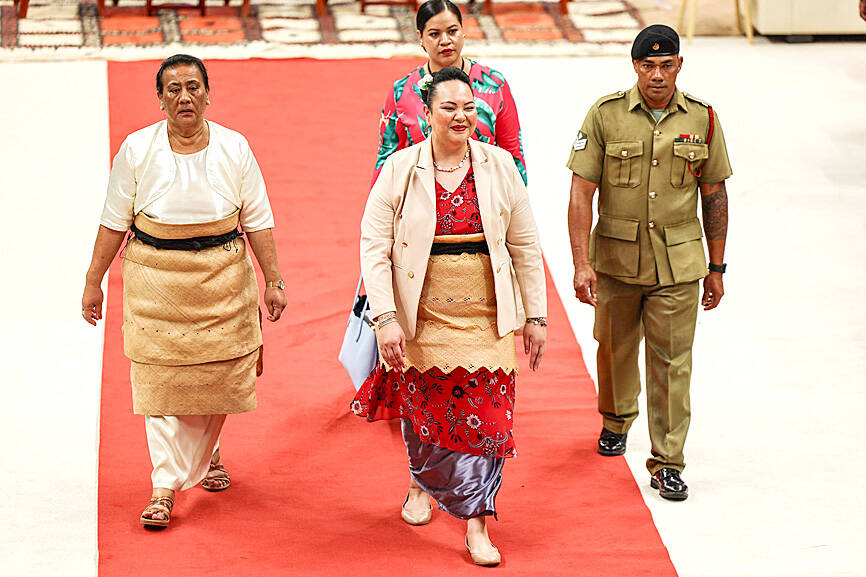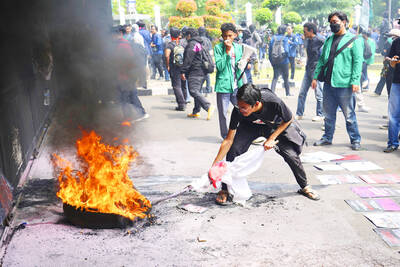Emissions-belching nations yesterday were challenged to stump up for climate-related damage as a key Pacific islands summit opened, with low-lying Tuvalu declaring: “If you pollute, you should pay.”
The Pacific Islands Forum got underway in Tonga’s capital, Nuku’alofa, with leaders hoping to draw global attention to the region’s worsening climate plight.
“We really need to ensure that we continue to push for action from countries that are the most polluting,” Tuvaluan Minister of Home Affairs, Climate Change and Environment Maina Talia said on the sidelines of the summit. “Polluter pays should be on the table.”

Photo: AFP
Pacific leaders are to mount a renewed push later this week for a homegrown climate adaptation fund, an idea that largely hinges on financial contributions from foreign nations. They are also to push to speed the transition away from oil, gas and other highly polluting fuel sources.
“We cannot address climate change without addressing the root cause, which is the fossil fuel industry,” Talia said. “It’s disaster after disaster, and we are losing the capacity to rebuild, to withstand another cyclone or another flood.”
That is awkward for forum member Australia, a coal-mining superpower belatedly trying to burnish its green credentials.
Australia wants to cohost the COP31 climate conference alongside its Pacific neighbors in 2026, but first, it must convince the bloc it is serious about slashing emissions.
UN Secretary-General Antonio Guterres is making a rare appearance at the summit, in a trip designed to highlight the Pacific’s myriad climate threats.
“The decisions world leaders take in the coming years will determine the fate, first of Pacific Islanders, and then everyone else,” Guterres said. “If we save the Pacific, we save the world.”
Foreign dignitaries were briefly sent scuttling for cover when a magnitude 6.9 earthquake struck off Tonga’s coast early yesterday, but no major damage or injuries were reported, and no tsunami warning was issued. The summit had earlier began with melodic Tongan choir singers and dancing schoolchildren in traditional dress.
However, beneath the bonhomie rare fissures have been forming in the 18-member bloc, with Pacific nations torn over China’s security ambitions in the region.
“We gather at a pivotal time in our region’s history,” forum secretary and former Nauruan president Baron Waqa said. “We are at the center of global geopolitical interest.”
China’s interest, specifically, was evident long before Waqa’s opening speech. Large “China Aid” signs were installed outside the newly built conference venue, a US$25 million gift from Beijing.
Meanwhile, the US has dispatched US Deputy Secretary of State Kurt Campbell to lead its forum delegation. Campbell has been one of the key figures behind a US-led push to keep China’s Pacific ambitions in check.
“We need to remain vigilant on issues of regional security,” said Waqa, who has taken a dim view of the escalating Beijing-Washington rivalry in the past.
The other pressing security challenge facing Pacific leaders is the unresolved crisis in French territory New Caledonia, which reared its head on the opening day.
“We must reach consensus on our vision for a region of peace and security,” Tongan Prime Minister Siaosi Sovaleni said. “We must honor the vision of our forefathers regarding self-determination, including in New Caledonia.”
Much of New Caledonia’s ethnically Melanesian Kanak population fears that voting reforms put forward by Paris could crush their dreams of independence.
It is a cause that resonates widely in the Pacific bloc, which is stacked with former colonies now fiercely proud of their hard-won sovereignty.
The fractious topic of deep-sea mining does not sit on any official agenda, but is likely be a topic of heated debate behind closed doors. Forum host Tonga sits at the vanguard of nations eager to open up the emerging industry, joined by fellow forum members Nauru and the Cook Islands, but others such as Samoa, Palau and Fiji see it as an environmental catastrophe in the making, giving their full-throated backing to an international moratorium.

The head of Shin Bet, Israel’s domestic intelligence agency, was sacked yesterday, days after Israeli Prime Minister Benjamin Netanyahu said he no longer trusts him, and fallout from a report on the Oct. 7, 2023, Hamas attack. “The Government unanimously approved Prime Minister Benjamin Netanyahu’s proposal to end ISA Director Ronen Bar’s term of office,” a statement said. He is to leave his post when his successor is appointed by April 10 at the latest, the statement said. Netanyahu on Sunday cited an “ongoing lack of trust” as the reason for moving to dismiss Bar, who joined the agency in 1993. Bar, meant to

Indonesia’s parliament yesterday amended a law to allow members of the military to hold more government roles, despite criticisms that it would expand the armed forces’ role in civilian affairs. The revision to the armed forces law, pushed mainly by Indonesian President Prabowo Subianto’s coalition, was aimed at expanding the military’s role beyond defense in a country long influenced by its armed forces. The amendment has sparked fears of a return to the era of former Indonesian president Suharto, who ex-general Prabowo once served and who used military figures to crack down on dissent. “Now it’s the time for us to ask the

DEATH CONSTANTLY LOOMING: Decades of detention took a major toll on Iwao Hakamada’s mental health, his lawyers describing him as ‘living in a world of fantasy’ A Japanese man wrongly convicted of murder who was the world’s longest-serving death row inmate has been awarded US$1.44 million in compensation, an official said yesterday. The payout represents ¥12,500 (US$83) for each day of the more than four decades that Iwao Hakamada spent in detention, most of it on death row when each day could have been his last. It is a record for compensation of this kind, Japanese media said. The former boxer, now 89, was exonerated last year of a 1966 quadruple murder after a tireless campaign by his sister and others. The case sparked scrutiny of the justice system in

The central Dutch city of Utrecht has installed a “fish doorbell” on a river lock that lets viewers of an online livestream alert authorities to fish being held up as they make their springtime migration to shallow spawning grounds. The idea is simple: An underwater camera at Utrecht’s Weerdsluis lock sends live footage to a Web site. When somebody watching the site sees a fish, they can click a button that sends a screenshot to organizers. When they see enough fish, they alert a water worker who opens the lock to let the fish swim through. Now in its fifth year, the